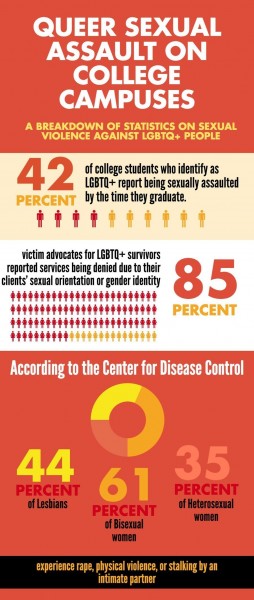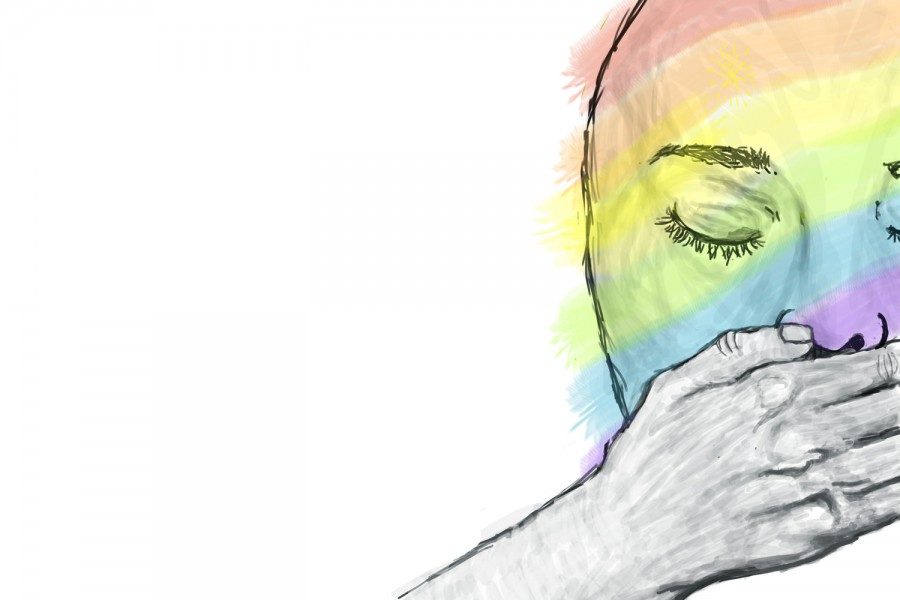Your donation will support the student journalists of Tulane University. Your contribution will allow us to purchase equipment and cover our annual website hosting costs.
Margaux Armfield | Staff Artist
Queer students face challenges with sexual assault dialogue
April 20, 2017
Queer college students are two times more likely to be sexually assaulted before graduating than their straight-identified classmates.
According to a survey conducted by the National Sexual Violence Resource Center, 42 percent of college students who identify as LGBTQ+ or queer report being sexually assaulted by the time they graduate.
Though Tulane has a number of resources for survivors of sexual assault, the university has been criticized in the past for not fully addressing sexual assault outside of heteronormative experiences.
A Tulane senior, whose first name is Elizabeth but who will otherwise remain anonymous, identifies as queer and said she felt uncomfortable discussing her sexual assault with any university resources because of the nature of the issue.
“While I am thankful that [Tulane organizations] are there and talking about rape and assault, etc., I feel like it is always a cis[gender] man and cis woman, and there is not even a conversation at all about queer people, especially with resources,” Elizabeth said.
Julia Broussard, assistant director of case management and victim support services for the Tulane University Office of Student Affairs, said the national trend points to an underlying problem of marginalization and isolation for queer students.
“Queer individuals already face greater rates of harassment, stigma and discrimination, which in turn can create vulnerability,” Broussard said. “Someone who is new to navigating queer relationships may experience greater vulnerability in dating and intimate interactions, which in turn creates an opportunity for a sexual predator.”
Another barrier to expanding the conversation around queer sexual assault that Broussard cited is the delegitimizing of reports by queer students from medical officials, law enforcement and the judiciary system.
According to a survey conducted in 2016 by the National Coalition of Anti-Violence Programs, 85 percent of victim advocates for LGBTQ+ survivors reported services being denied due to their clients’ sexual orientation or gender identity.
“We know from research that queer students are less likely to report their assaults for a variety of reasons,” Broussard said. “In addition to the fears that survivors in general face, queer survivors may also fear insensitive or discriminatory responses from police [and] helping professionals.”
Louisiana state law specifies that rape of all degrees must involve “anal, oral, or vaginal sexual intercourse.” The use of language that specifies penetration excludes primary sexual acts in the queer community that do not involve penetration but which can still be non-consensual and considered rape outside of the courtroom.
Though there is a law against oral sexual battery specifically addressing the non-consensual touching of another person’s genitals, the maximum sentencing for rape of any degree differs by decades from that of oral sexual battery.
Broussard said that though she has seen an effort made by New Orleans Police Department and the District Attorney’s office to investigate and prosecute cases of sexual assault between queer individuals, the nature of these crimes along with the social stigmas surrounding them can complicate the legal process.
“It can be harder for prosecutors to get convictions in these cases because of the prejudices that the general public tend to hold, such as believing that men can’t be victims, women can’t be perpetrators, etc.,” Broussard said.
In an effort to address issues regarding the experience of queer survivors, Tulane student organizations like Sexual Aggression Peer Hotline and Education have tried to expand their programming to reflect the needs of Tulane’s entire student body.
“As an organization going forward, we are going to try to make ourselves more accessible to marginalized communities on campus, especially because we’ve catered a lot to the Greek life, and we are trying to diverse from that,” SAPHE member and Tulane senior Teryn Yazdani said.
Broussard said that the burden of improvement ultimately rests on those working in the field of sexual assault prevention.
“I think advocates and policy makers always need to consider how laws help, hurt or ignore marginalized groups,” Broussard said. “In general, I do see students, queer and straight, who are impacted by sexual battery not being considered as serious as rape under Louisiana law.”


Julia Stainback • Apr 21, 2017 at 7:00 am
Thank you for shining a light on this injustice. The Tulane community is fortunate to have your strong, clear voice.
Annie Martin • Apr 20, 2017 at 8:46 am
Love love love this article.
Very eye opening and leaves me hopeful for the future of the destigmatization of LGTBQ+ individuals who are involved in these henious acts.